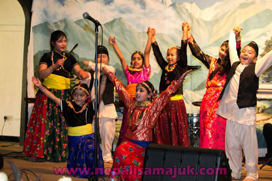
Kosheli - A dawn of hope
In the year 1986, a lifelong dream of the then music enthusiasts Lalita Manandhar, Madan Thapa , Ganesh Ghimire and Bijaya Shrestha was materialised when Padam Prakash Shrestha proposed the name of Kosheli in the then music rehearsal venue of Orient Nepalese restaurant- a sister interest of the then Natraj restaurant of Charlotte street in central London. The proposal was welcomed by all unanimously, which paved the way for this monumental event that changed everything thereafter.
.jpg)
Kosheli was born without much of fanfare, pomp and pageant but amidst great enthusiasm, hope and pride. The lasting effect that unfolded before our own eyes over the time has far out-weighed everything else. It proved to be beyond one's expectation and estimation. It heralded a new dawn of hope.
In the 50's and 60's very sparsely scattered Nepalese population mainly students felt the need of a place where they could simply get together, help each other and feel close to home. Thus, the concept of Yeti was conceived.
In the 60's and 70's things started to take shape after people of different professions notably catering sector entered new life in Britain.
Yeti was born, but its scope and activities were limited in the beginning due to the lack of art, culture and traditional activities to accommodate all.
No doubt, people had achieved their fair share of economic success and inflated glory, but still the sense of emptiness troubled mostly those close to the country. The life blood of Nepal - the art and culture that guided our unique way of life was missing. The void was broadening by the day. The suffocation was unbearable.
When something reaches its height or boiling point changes are imminent. Something is bound to happen.
.jpg)
A grain of decaying seed under the wrap and warmth of mother earth coupled by a favourable weather and caring hands would undergo a vital transformation within and sprout one day for sure. It will grow to be an enormous tree that would offer shade and shelter equally to all those enduring scorching heat regardless of cast and creed. All that is required is someone to lead the way guide and steer. This was exactly what happened.
Madan Thapa rose to the challenges and ventured into the unchartered water, undertaking this extremely important journey realising and envisaging the enormity of the task ahead..jpg)
.jpg)
If something was not done soon enough, the grand tradition and indigenous pride which has so much to offer to the wider world would one day be relegated to history and lost in the darkness of oblivion, just like much of art and culture that is not seen and practiced anymore but only read about in history books.
With firm backing from fellow music lovers, invaluable advice from Dhurba KC, Basanta Rayachhetri, Ishwor Manandhar and Dr Raghav Prasad Dhital soon after, Madan Thapa took control of the ship embarked on the long voyage with tonnes of cargo on board defying all the extremes of treacherous weather through the sheer volume of deep - dark ocean heading towards the destination of immense joy and happiness.
Ishwor Manandhar once commented "Madan Thapa deserves a pat on the back for where Kosheli is today. It wouldn't be here in its current form if it was not for his unbelievable passion, dedication and perseverance ".
.jpg)
There are so many who would wholeheartedly echo this sentiment that Madan Thapa, for a long period of time single handedly fought to keep Kosheli alive when its own survival was at stake.
I sincerely hope and believe, it would not be a biased view or labelled it as over exaggeration if I said Madan Thapa's selfless submission and unabating enthusiasm for a long period of time has not just shaped Kosheli and placed it in the unique position, but has also helped brought all ethnic groups of Nepalese origin together.
As the time and tide continued, ebb and flow kept roaring, Bijaya Shrestha, Ganesh Ghimire and Lalita Manandhar gradually scaled back from active role owing to respective personal circumstances; but sole survivor Madan Thapa had already vowed and realised the music was what he was made for. He believed in "Simple living and high thinking" and indeed led a simple life devoted to musical pursuit. The music maestro has now spent almost half a century in nurturing Nepali music in the UK. He has always been an incessant source of inspiration to all artists and music lovers.
As an ultimate recognition to his outstanding contribution and devotion to Nepalese arts and culture in the UK, the then King Birendra in the turn of the millennium, decorated Madan Thapa with "Gorkha Dakshin Bahu " which he subsequently dedicated to all artists and supporters on behalf of Kosheli.
.jpg)
In it's early days Kosheli's role was to entertain guests and officials. As well as foreign dignitaries in the then Royal Nepalese Embassy and handful of other programmes with friends and families. Artists were scarce.
Gradually Kosheli reshuffled, expanded and reinvigorated it's efforts by incorporating fresh talents thus addressing growing need of time where everyone could feel at home.
In 2006, Basanta Rayachhetri was elected as new president who, like his predecessor had years of experience and proven track record. He diligently discharged his duties to the best of his ability for almost half a decade. He left no stone unturned to make the great history even greater. .jpg)
.jpg)
Kosheli has always been the glorious centre of art and culture, and the cultural ambassador in the UK, due to the patronage of Nepalese people themselves. It has represented Nepal on number of occasions at national and international level. I, still recall the magical moment of that fine early summer morning of 1995, following the sleepless overnight intensive rehearsal, representing Nepal in front of thousands of cheering crowds on the grand stage of Hyde park during the VE day ceremony.
Obviously, Nepal has a strong tradition and heritage to draw inspiration from. Arts and culture are the pillars of country’s strength and resilience. Kosheli has unfailingly fulfilled its responsibility with intensity and depth.
.jpg)
Kosheli has always shunned itself from commercially motivated performances for the sake of our age -old tradition but has instead supported and actively contributed in the fund raising activities of various charity organisations, schools and communities including the "Yeti Welfare Foundation"
The then outgoing president of Yeti Association Mr Nima Wangden Lama was quoted in a Nepali newspaper in 2005, as proudly acknowledging " In fact Kosheli has helped raise about seventy five percent of the Yeti Welfare Foundation's total fund estimated approximately one hundred thousand pounds”.
Following the aftermath of the most recent devastating earthquake in Nepal Kosheli office bearers and general members physically attended a number of fund raising rounds in the streets of London, with a bucket in their hands and Nepal in the hearts. They managed to raise almost five thousand pounds which is already a lot of money in monetary value, but worth even more in significance and gesture.
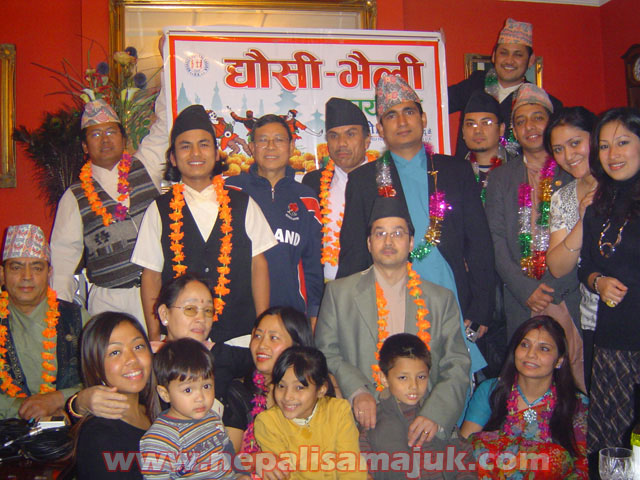
This alone reveals the depth of its involvement in the charitable cause. It's greatness is depicted in people's hearts, not in documents.
We are representing present generation. We have inherited the cultural heritage of our time from our predecessor. We, as the trustee of time need to preserve and transmit it to the posterity. This is how the culture is preserved and cascaded down to the new generation, for the sake of the nation and for our survival with own identity.
I, myself feel profoundly indebted and humbled by the numerous wonderful opportunities that was entrusted to me by Kosheli for several years, which did not just provide me with the rare opportunity of serving my country from abroad, but also nurtured and helped unearth my potential which otherwise would have remained dormant forever.
With years of hectic and rigorous efforts, tested and tried by innumerable time, tide and topsy-turvy hurdles, Kosheli has come a long way from where it can proudly look back and deservedly breathe some sigh of relief..jpg)
.jpg)
Kosheli has always been very fortunate to have had this array of dedicated artists on its side. The likes of Suresh Chandra Pradhan, Narendra Pyasi, Sujan Ghimire, Rajendra Bhuju, Anil Thapa, Pramod Sharma, Hemanta Acharya, Pasang Gautier, Binod Shrestha and Sabin Rajbhandari will never be forgotten. They have not just shown their true worth when it mattered the most, but also have stood firm throughout its turbulent past. The bond is stronger than ever.
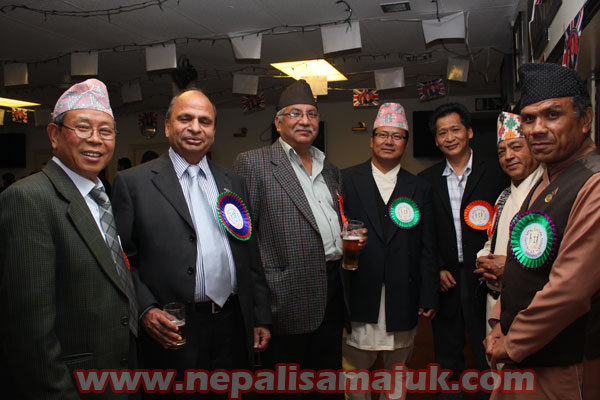
Today Kosheli is in safe hands in the leadership of yet another Kosheli prodigy Mr Amrit Gurung. Nobody would dare to tread this path if they did not have courage to shoulder the weight of past and clear vision of obstacles ahead.
Amrit Gurung surprised everyone and excelled in every department spectacularly.
One of the most important achievements during his tenure is Kosheli being officially registered as charity in the UK. This historical event has further streamlined Kosheli and smoothened the path with clear direction ahead.
He is now serving the second term of his presidency. He is flanked by truly gifted artists with vast knowledge and experience.
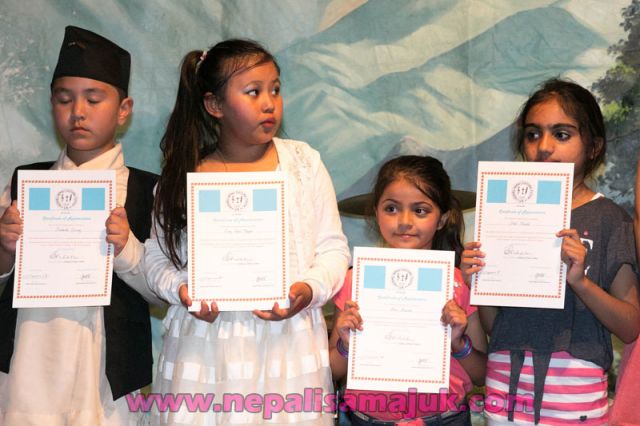
Gita Thapa, Sharmila Singh and Ruby Thapa have sacrificed a lot beyond expression. 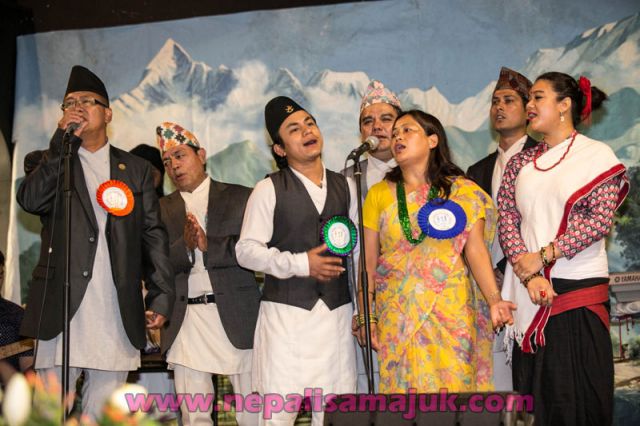

Mr Sushil Singh as a media partner on behalf of Nepali Samaj UK, has remained discreet in his incomparable contribution day and night, which has not gone unnoticed in public eyes. Ujjwol Shrestha and Purna Man Bajracharya have added a new dimension to it. The towering figures of Nepali community in the UK, Mr Dhurba KC, Bijaya Thapa, Hari Thapa, Mahanta Shrestha, Dr Raghav Prasad Dhital, Pashupati Bhandari, Suresh Jung Shah, Birendra Kunwar, Hom Paribag and many more have always been all weather friends. The then child artists Srijana Singh and Rabina Kunwar, performing on stage from the very early age, when they were hardly able even to walk on their own, is really touching and deserves a fitting tribute.

One of the most respected senior figures of Nepalese community in the UK, the late Ishwor Manandhar supported and cared for it from day one, until the moment he breathed last. This wonderful human being, a beacon of hope and the guiding light in our society will be sorely missed. He remains in the core of our hearts.
The Nepalese community in the UK has adopted Kosheli as its own. True followers have never deserted once coming into contact with it, rain or shine.
In the light of these contributing factors, the future of Kosheli looks very bright. It has all it takes to advance further on a long way ahead.
Edited by:
.png)
Puran Thapa
